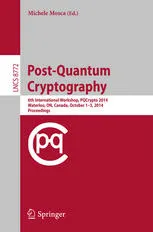Post-Quantum Cryptography: 6th International Workshop, PQCrypto 2014, Waterloo, ON, Canada, October 1-3, 2014. Proceedings
4.8
Reviews from our users

You Can Ask your questions from this book's AI after Login
Each download or ask from book AI costs 2 points. To earn more free points, please visit the Points Guide Page and complete some valuable actions.Introduction
The field of cryptography is at an exciting and transformative crossroads with the advent of quantum computing. The book Post-Quantum Cryptography: 6th International Workshop, PQCrypto 2014, Waterloo, ON, Canada, October 1-3, 2014. Proceedings is a pivotal compilation that captures breakthrough discussions, theories, and academic advancements in post-quantum cryptography. It systematically articulates the state of cryptographic research during a crucial era where the need for cryptosystems resilient to quantum attacks became increasingly apparent.
Edited by Michele Mosca, a leading authority in quantum technologies and information security, this volume stands as a cornerstone in the domain of post-quantum cryptography. Organized as the proceedings of the PQCrypto 2014 conference, it brings together contributions from world-renowned experts, providing both theoretical insights and practical implications. The book not only sheds light on the vulnerabilities of classical cryptographic systems in the face of quantum computing but also explores cutting-edge approaches aimed to secure our digital future. Below, you will find a comprehensive overview of the book, its key takeaways, notable quotes, and why it holds immense importance for researchers and practitioners alike.
Detailed Summary of the Book
Post-Quantum Cryptography: 6th International Workshop highlights the evolving landscape of cryptography amidst the looming threat of quantum computing. The proceedings focus on novel cryptographic systems and mathematical approaches designed to withstand quantum attacks. Topics covered include:
- Lattice-based cryptography and its applications in post-quantum systems.
- Code-based cryptography, including its resilience against quantum algorithms like Shor's algorithm.
- Multivariate polynomial cryptosystems and their potential to remain secure in a post-quantum world.
- Quantum-resistant digital signature schemes and other practical implementations.
- An in-depth discussion on the threats posed to traditional cryptographic protocols by advances in quantum computing.
What makes this volume unique is its focus on both the mathematical rigor and real-world practicality of cryptographic solutions. Researchers detail the strengths and weaknesses of various approaches, weigh their feasibility, and explore trade-offs between security, computational efficiency, and ease of implementation. Rather than focusing solely on hypothetical scenarios, this book offers actionable theories that inspire continued innovation in the field.
Key Takeaways
This book provides invaluable lessons for academics, cryptographers, policymakers, and technologists striving to design future-proof cryptosystems. Some of the critical takeaways include:
- Urgency of Post-Quantum Readiness: There is a pressing need to transition from classical cryptography to post-quantum solutions to secure sensitive data in the face of advancing quantum technologies.
- Diversified Approaches: A "one-size-fits-all" approach is unlikely to work. Future cryptographic security will rely on a combination of diverse systems, such as lattice-based, code-based, and multivariate cryptosystems.
- Balancing Security and Efficiency: Implementing post-quantum cryptography involves striking a delicate balance between robustness against quantum attacks and feasibility in terms of computational resources.
- Theoretical Foundation Meets Practicality: For cryptosystems to succeed, they must have both theoretical soundness and practical usability in real-world applications.
Famous Quotes from the Book
Here are some impactful quotes from the distinguished contributors of this book:
"In the wake of quantum computing, cryptographers face a paradigm shift akin to rebuilding bridges in the face of rising seas." – Michele Mosca
"Security is only as good as the assumptions we make. Quantum computing challenges our most critical assumptions, forcing us to innovate beyond classical paradigms." – Contributing Author
Why This Book Matters
The potential emergence of large-scale quantum computers has raised alarms across disciplines, with cryptography being one of the most critically affected fields. Nearly all prevalent cryptographic protocols, like RSA and ECC, rely on mathematical problems easily resolved by quantum algorithms such as Shor's algorithm. Consequently, there is a growing imperative to develop cryptosystems resistant to quantum attacks, often referred to as post-quantum cryptography.
Post-Quantum Cryptography: PQCrypto 2014 is integral to this global effort. It stands as a crucial compendium, compiling key contributions from some of the most brilliant minds in the field. By laying out cutting-edge research and fostering global collaboration, this volume serves both as a benchmark for the present state of post-quantum cryptography and as a catalyst for its future development.
The continued reliance on classical cryptographic infrastructure without a proactive transition to quantum-resistant protocols could place sensitive communications, financial systems, and national security data at critical risk. Thus, this book is not merely significant for cryptographers but for anyone invested in the future of secure communication, privacy, and global cybersecurity.
Free Direct Download
Get Free Access to Download this and other Thousands of Books (Join Now)
For read this book you need PDF Reader Software like Foxit Reader


